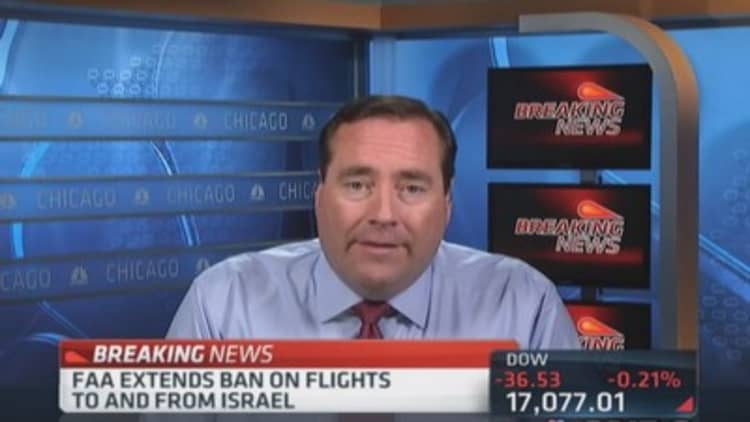The combination of Malaysia Airlines Flight MH17 being shot down over Ukraine and airlines halting flights into Tel Aviv is stirring up controversy over who should decide when and where it's safe for airlines to fly.
The British Airline Pilots Association on Wednesday called for a discussion about how decisions are made regarding where airlines should fly, saying international aviation agencies should have greater powers to make safety decisions.
The announcement came as former New York City Mayor Michael Bloomberg flew into Tel Aviv on an El Al flight to protest the U.S. Federal Aviation Administration's directive barring U.S. airlines from flying into Ben Gurion Airport, a ruling that was extended another 24 hours on Wednesday. The agency issued its initial ban on Tuesday, hours after a Hamas rocket landed near Ben Gurion Airport.
"It is safe to fly in and out of Israel," Bloomberg said. "Ben Gurion is the best protected airport in the world and El Al flights have been regularly flying in and out of it safely. The flight restrictions are a mistake that hands Hamas an undeserved victory and should be lifted immediately."
Read MoreIsrael flight ban leaves travelers scrambling
Under current protocol, airlines and governments around the world are responsible for making those decisions—a practice that has led to a number of inconsistencies around the globe.
"This risk assessment approach can give an illusion of safety, but it is in fact vulnerable to all sorts of influences, including commercial pressure," said Jim McAusian, general secretary of the British Airline Pilots Association union. "Individual pilots looking at their flight plans need to have absolute confidence that the right calls are being made."
Before the FAA issued its initial ban, the three U.S. carriers that have daily service to Israel—Delta, United Airlines and US Airways—had already decided to suspend their operations. Delta made its decision while one of its flights was over the Mediterranean Sea approaching Israel. It subsequently was diverted to Paris.
Read MoreDelta waits on return to Israel; Lufthansa extends ban
"We routinely at Delta establish what we call Delta No Fly Zones," CEO Richard Anderson told CNBC. "Today for instance, we're not flying to Israel. We will not allow a flight to be dispatched over Iran, Iraq, Syria, Ukraine, Afghanistan or North Korea. And we make those decisions and have an obligation to make those decisions wholly independent of any geopolitical or regulatory mandate."

So far, 160 Tel Aviv flights (80 inbound, 80 outbound) have been canceled, according to the Ministry of Transport and Road Safety.
Read MoreDespite safety fears, Kerry, Bloomberg fly to Israel
Just eight of those involve Delta, United or US Airways. The others involve airlines such as Lufthansa and Air France.
On Wednesday, Lufthansa extended its suspension of flights to Tel Aviv, saying: "At the present time no adequate authoritative new information is available that would justify a resumption of flights. In close coordination with the responsible authorities Lufthansa is continually evaluating the safety situation for its total flight network."
—By CNBC's Phil LeBeau. NBC News contributed to this report.


